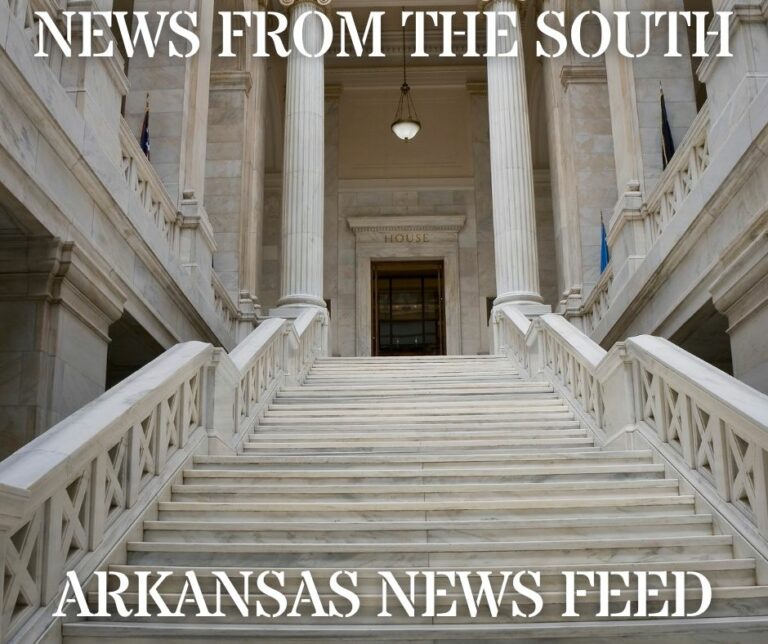News from the South - Louisiana News Feed
Proponents of Mid-Barataria diversion warn against abandoning wetlands
by Elise Plunk, Louisiana Illuminator
May 12, 2025
Supporters of the Mid-Barataria Sediment Diversion project took to the State Capitol steps Monday afternoon, urging state leaders to advance the stalled coastal restoration project.
The Mid-Barataria project, part of the Louisiana Coastal Master Plan to rebuild wetlands with diverted sediment and water from the Mississippi River, is often hailed as the cornerstone project in Louisiana’s fight to rebuild its rapidly sinking coastline.
Gov. Jeff Landry has railed against the plan’s high cost and impact to fisheries, blaming a key Army Corps construction permitting loss on former Gov. John Be Edwards. The pause has prompted increasing uncertainty as to whether the massive coastal restoration plan will continue as originally designed.
Advocates of the project worry any alternate plans will mean further delays or – worse yet – inactivity that could spell doom for Louisiana’s coast.
“Now is the time for courage and action,” Simone Maloz, campaign director of Restore the Mississippi River Delta, said during a news conference in concert with the Capitol demonstration. Supporters held aloft signs with phrases promoting sediment diversions printed boldly across pictures of Louisiana’s coast as speakers took turns at the lectern to speak about the uncertain project.
“Honor the legacy of our coastal program and recommit to the bold vision our coast demands, including resuming construction on the Mid-Barataria Sediment Diversion,” Maloz added.
“The river built the land, now we must let it help us heal it,” the Rev. Ernest Dison Sr., pastor at a church in the Lower 9th Ward of New Orleans, said during the rally. His neighborhood went underwater in 2005 when storm surge from Hurricane Katrina exposed design flaws in floodwalls along the Industrial Canal and Mississippi River Gulf Outlet. Decades of wetlands diminishment allowed the storm surge to reach the city largely unabated.
Dison said his faith and environmental stewardship are closely entwined, and the risk storms pose to his community convinced him to speak out in support of the coastal master plan.
“We need to protect our communities,” he said. “This Mid-Barataria Sediment Diversion project gives us hope. We can’t afford to waste that opportunity to be good stewards of what we’ve been given.”
Money problems
The Coastal Restoration and Protection Authority and Louisiana Senate has approved more than $500 million for Mid-Barataria construction to begin despite its status being in limbo.
Opponents of the large-scale diversion, including those with fisheries interests, have floated the idea of using the money to build smaller sediment diversions. But whether funding can be redistributed that seamlessly is a question with no outright answer.
Louisiana’s money for coastal restoration comes largely from a trust created with BP oil spill settlement dollars. A cohort of federal agencies, including the National Oceanic and Atmospheric Association, Environmental Protection Agency and Department of the Interior, oversee the funds
Maloz said in an interview she is concerned an alternate plan might not get the same financial approval Mid-Barataria did from the trust overseers.
“[The Mid-Barataria Sediment Diversion is] very tied to the damage that happened … that money is intended to mitigate and fix that problem,” she said. “That’s a huge question that is looming on the alternatives … is that the right project to mitigate for those injuries, for that natural resource damage that occurred from the oil spill?
Smaller scale diversions
Diversion advocates and scientists maintain smaller diversions aren’t as effective at rebuilding wetlands, still sending fresh water into Barataria Bay but with less benefit.
Opponents fear the deluge of fresh water from the Mississippi River would alter the salt content of the brackish water, killing shrimp and oyster populations near shore and pushing other marine life away from the coast.
Ehab Meselhe, a Tulane University professor and scientist who worked on hydrologic modeling for the Mid-Barataria plan, published a number of peer-reviewed studies modeling smaller Mississippi River diversions. They involved moving a fraction of the water Mid-Barataria currently proposes. His findings: Less water meant less wetland growth.
“It’s not going to move as much sediment, build as much land,” Meselhe said, all while concerns over impacts to oysters and shrimp stick around. “There is no doubt… you will have the impacts, and definitely a lot less benefit.”
Even still, he emphasised the need to find a solution that involves and supports the people who live in the area.
“There is no silver bullet solution. Every time you touch the system, you will have benefits and you will have impacts,” Meselhe said. “Some strategies are better than others … I think we need to sit at the table and see what are the palatable options that are out there, and these are the ones we need to pursue.”
Anne Milling, founder of post-Katrina advocacy group Women of the Storm, said in an interview that mitigation dollars tied to Mid-Barataria gave the plan actionable ways to support fisheries.
“Yes, it’s our culture of Louisiana, which I love and adore and respect,” Milling said. “You’ve got to remember that $375 million was set aside in the Mid-Barataria Diversion project to compensate and help the communities relocate from any disturbance from this diversion.”
“We cannot afford to take solutions off the table,” Maloz said, voicing her organization’s support for small-scale diversions in other areas while still standing in support of Mid-Barataria.
“There was a really extensive process that said, ‘This is the solution that matches the loss in that basin. This is what it needs for that overall long term health,’” she added.
Permit drama increases uncertainty
Controversy over a pulled construction permit and a social media fight between Landry and his predecessor, Edwards, have heightened tensions and uncertainty over the Mid-Barataria Sediment Division even further.
Landry delivered a harsh critique of Mid-Barataria last November, saying the threat it posed to the shrimp and oyster industry would “break” Louisiana culture. His administration then issued a 90-day pause on all work related to the project on April 4, saying the high cost called for a smaller-scale diversion.
The Army Corps recently revoked a permit for the nearly $3 billion project, citing unreported documents, project uncertainty and lack of support from the current governor’s administration as reasons to reconsider. Landry accused Edwards of purposely hiding a 500-page study from Army Corps officials.
Edwards countered Landry’s claims, saying accusations of a cover-up are unfounded, and stressed that the report in question didn’t change the science behind the Mid-Barataria plan, The Times-Picayune reported.
Maloz said she believed the project had everything it needed for approval, wanting more answers from the Army Corps decision.
“We feel like we went through this really extensive process that had science, that had people, that had communities all in mind to get us to a decision on both the permit and the funding,” she said. “And now it feels like we have been entirely cut out of that process.”
Louisiana Illuminator is part of States Newsroom, a nonprofit news network supported by grants and a coalition of donors as a 501c(3) public charity. Louisiana Illuminator maintains editorial independence. Contact Editor Greg LaRose for questions: info@lailluminator.com.
The post Proponents of Mid-Barataria diversion warn against abandoning wetlands appeared first on lailluminator.com
Note: The following A.I. based commentary is not part of the original article, reproduced above, but is offered in the hopes that it will promote greater media literacy and critical thinking, by making any potential bias more visible to the reader –Staff Editor.
Political Bias Rating: Center-Left
This content shows a Center-Left bias as it favors environmental restoration efforts and supports a large-scale government-backed coastal restoration project while criticizing the current governor’s opposition. It frames the restoration project as necessary for community and environmental well-being, highlighting advocacy groups and scientific opinions in support of the initiative. It also portrays concerns about economic and cultural impacts raised by opponents but ultimately leans towards prioritizing environmental science and long-term ecological benefits, which aligns with Center-Left perspectives on environmental policy and government intervention.
News from the South - Louisiana News Feed
New immigrant-tracking laws take effect in Louisiana
SUMMARY: Two new Louisiana laws, effective mid-2025, require state agencies and public colleges to collect and share data on undocumented immigrants, including reporting ineligible applicants for benefits to federal immigration authorities. Act 419 mandates tracking immigration status of those using state services, while Act 351 requires reporting applicants denied benefits like SNAP or Medicaid to ICE. These laws follow federal efforts to expand data collection, raising fears that immigrant families, including those with U.S. citizen children, may avoid public benefits out of fear. Implementation details remain unclear, causing concern among immigrant advocates about increased isolation and chilling effects on access to essential services.
The post New immigrant-tracking laws take effect in Louisiana appeared first on thecurrentla.com
News from the South - Louisiana News Feed
Hurricane Erin to grow larger as two other tropical spots linger behind
SUMMARY: Hurricane Erin is intensifying in the western Atlantic with 110-mph winds, located 665 miles southwest of Bermuda. The National Hurricane Center forecasts it will move north-northwest then northeast, passing east of the Bahamas and between the U.S. East Coast and Bermuda. Currently a Category 2 hurricane, Erin may fluctuate in strength while expanding. Hurricane-force winds extend 80 miles from its center, with tropical storm-force winds reaching 205 miles. Tropical Storm Warnings and Watches are active for parts of the Bahamas and North Carolina, where mandatory evacuations have been ordered for Hatteras and Ocracoke Islands. Two other tropical disturbances in the Atlantic show potential for development later this week.
The post Hurricane Erin to grow larger as two other tropical spots linger behind appeared first on wgno.com
News from the South - Louisiana News Feed
State auditor claps back at former M-P Guillory – The Current
SUMMARY: The Louisiana Legislative Auditor’s Office (LLA) issued a comprehensive rebuttal after former Mayor-President Josh Guillory criticized their investigative audit into the 2022 secret removal of spoil banks in St. Martin Parish. The audit found that Lafayette Consolidated Government (LCG) violated multiple local, state, and federal laws by conducting the $3.7 million flood-control project without proper permits or jurisdiction and bypassing public bidding procedures. Guillory called the LLA corrupt and politically motivated, even posting derogatory images online. The LLA refuted these claims, clarifying their processes, timelines, and legal standing, and forwarded findings for possible prosecution. Guillory declined substantive interview opportunities during the investigation.
The post State auditor claps back at former M-P Guillory – The Current appeared first on thecurrentla.com
-
News from the South - Tennessee News Feed4 days ago
GRAPHIC VIDEO WARNING: Man shot several times at point-blank range outside Memphis convenience store
-
News from the South - Texas News Feed4 days ago
Kratom poisoning calls climb in Texas
-
News from the South - Texas News Feed2 days ago
New Texas laws go into effect as school year starts
-
News from the South - Florida News Feed2 days ago
Floridians lose tens of millions to romance scams
-
News from the South - Kentucky News Feed4 days ago
Unsealed warrant reveals IRS claims of millions in unreported sales at Central Kentucky restaurants
-
Our Mississippi Home6 days ago
Pride of Mississippi Marching Band to Kick Off Season with Free Concert
-
News from the South - Arkansas News Feed6 days ago
Idaho is losing OB-GYNs. Doctors who remain are trying to shoulder the extra burdens.
-
News from the South - Georgia News Feed7 days ago
2 Bricktowne Flats murder suspects allegedly killed 2 more people while out on bond













































